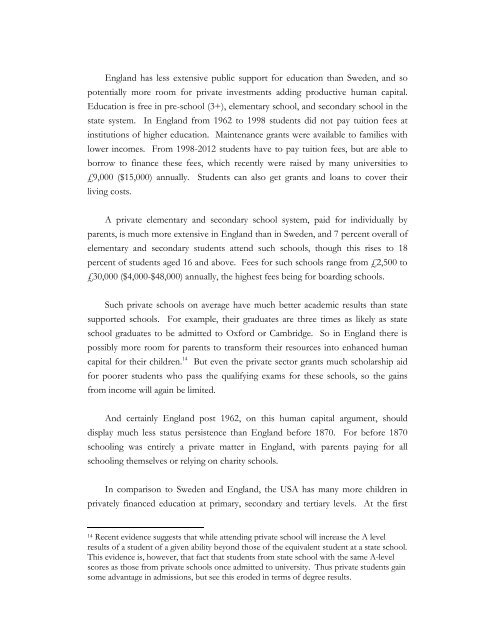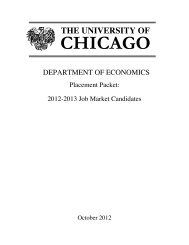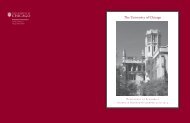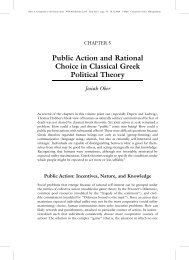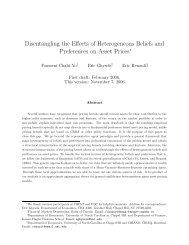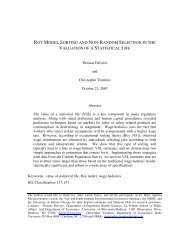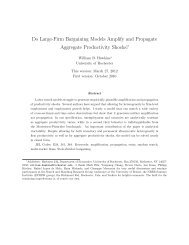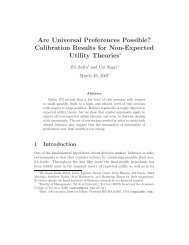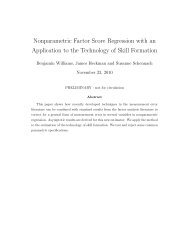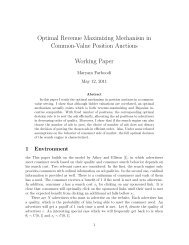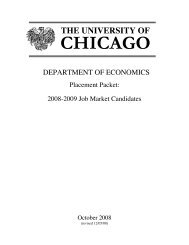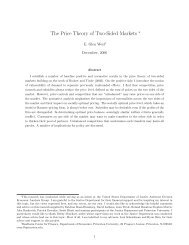Surnames and a Theory of Social Mobility - University of Chicago ...
Surnames and a Theory of Social Mobility - University of Chicago ...
Surnames and a Theory of Social Mobility - University of Chicago ...
Create successful ePaper yourself
Turn your PDF publications into a flip-book with our unique Google optimized e-Paper software.
Engl<strong>and</strong> has less extensive public support for education than Sweden, <strong>and</strong> so<br />
potentially more room for private investments adding productive human capital.<br />
Education is free in pre-school (3+), elementary school, <strong>and</strong> secondary school in the<br />
state system. In Engl<strong>and</strong> from 1962 to 1998 students did not pay tuition fees at<br />
institutions <strong>of</strong> higher education. Maintenance grants were available to families with<br />
lower incomes. From 1998-2012 students have to pay tuition fees, but are able to<br />
borrow to finance these fees, which recently were raised by many universities to<br />
£9,000 ($15,000) annually. Students can also get grants <strong>and</strong> loans to cover their<br />
living costs.<br />
A private elementary <strong>and</strong> secondary school system, paid for individually by<br />
parents, is much more extensive in Engl<strong>and</strong> than in Sweden, <strong>and</strong> 7 percent overall <strong>of</strong><br />
elementary <strong>and</strong> secondary students attend such schools, though this rises to 18<br />
percent <strong>of</strong> students aged 16 <strong>and</strong> above. Fees for such schools range from £2,500 to<br />
£30,000 ($4,000-$48,000) annually, the highest fees being for boarding schools.<br />
Such private schools on average have much better academic results than state<br />
supported schools. For example, their graduates are three times as likely as state<br />
school graduates to be admitted to Oxford or Cambridge. So in Engl<strong>and</strong> there is<br />
possibly more room for parents to transform their resources into enhanced human<br />
capital for their children. 14 But even the private sector grants much scholarship aid<br />
for poorer students who pass the qualifying exams for these schools, so the gains<br />
from income will again be limited.<br />
And certainly Engl<strong>and</strong> post 1962, on this human capital argument, should<br />
display much less status persistence than Engl<strong>and</strong> before 1870. For before 1870<br />
schooling was entirely a private matter in Engl<strong>and</strong>, with parents paying for all<br />
schooling themselves or relying on charity schools.<br />
In comparison to Sweden <strong>and</strong> Engl<strong>and</strong>, the USA has many more children in<br />
privately financed education at primary, secondary <strong>and</strong> tertiary levels. At the first<br />
14 Recent evidence suggests that while attending private school will increase the A level<br />
results <strong>of</strong> a student <strong>of</strong> a given ability beyond those <strong>of</strong> the equivalent student at a state school.<br />
This evidence is, however, that fact that students from state school with the same A-level<br />
scores as those from private schools once admitted to university. Thus private students gain<br />
some advantage in admissions, but see this eroded in terms <strong>of</strong> degree results.


